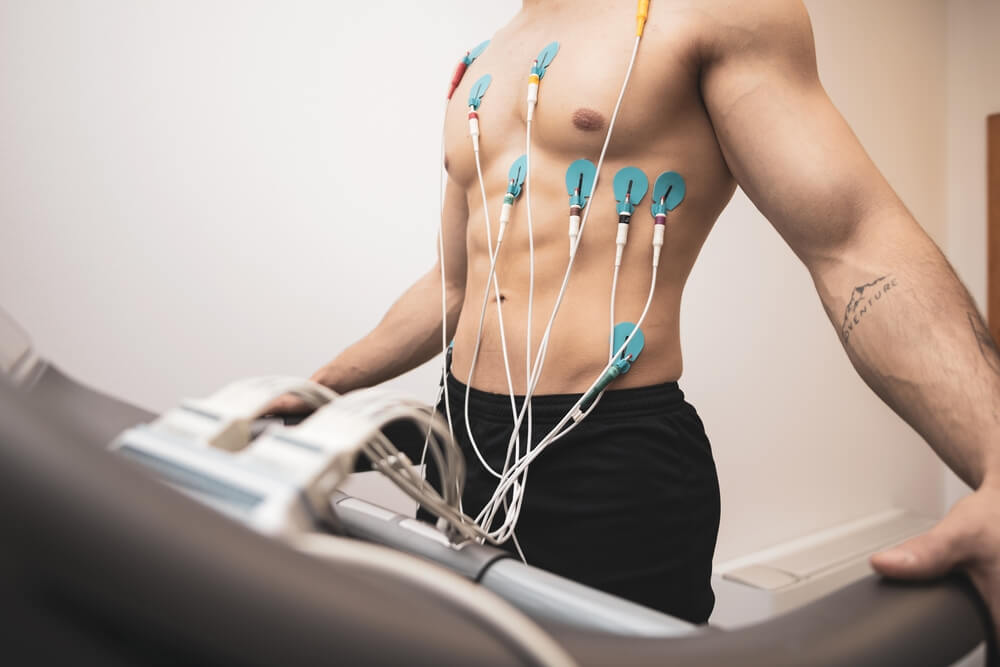


TMT Test means a Treadmill Test. It is a medical acronym for a heart test done using a treadmill.
Have you ever wondered how far your heart can go if it is put to higher and higher levels of stress? More and more youngsters are falling prey to heart attacks because they think external body fitness and heart fitness are the same things. They are not.
Moreover, whether young or old, if you are a patient with other ailments like hypertension, obesity, diabetes, or cholesterol – or you have a family history of heart disease – the chances of future heart attacks get multiplicative.
Doctors normally ask patients to go through the Treadmill (TMT) Test, if there is either a suspicion of heart ailment or even regularly as part of the Annual Health Check-Up Plan.
If you have doubts about the process and what it will take, we’ve put together the answers for you.
A treadmill test (TMT) is a form of cardiac stress test. Your doctor will ask you to walk (or later, even run) on a treadmill, and the difficulty level will be gradually increased. Your heart signals will be monitored as you do this activity.
The idea is to help your doctor determine how far your heart can go before it begins to suffer an abnormal rhythm – or the blood flow to your heart drops.
In short, it helps your doctor know how much stress your heart can take.
Children who are in high-heart-risk families, or those with congenital heart defects, may be put under TMT stress tests … but doctors will be very careful to set test limits to match the age group and heart conditions of such children.
More and more hospitals are indeed offering TMT tests to children. The University of IOWA Stead Family Children’s Hospital in the US even has a very reassuring YouTube video to show kids and their parents how a TMT test is done.
Adults too could benefit from watching this short, simple and clear video.
A Treadmill Test (TMT) is generally done to find the stress on the heart. On the treadmill machine, the patient is asked to walk or run, and the readings are taken.
An ECG (Electro Cardio Graph) test is quite different. Electrocardiography is the recording of the heart’s electrical activity over time via skin electrodes.
While a TMT test gauges the level of stress your heart can take, the ECG studies your overall heart rhythm to spot weaknesses in different parts of the heart muscle, which reflect abnormal rhythms of the heart.
Both TMT and ECG however cannot measure the pumping ability of the heart; for this, doctors have to depend on ultrasound-based echocardiography (also known as the ECHO tests).
For adults, the maximum predicted heart rate is generally expected to be 220 minus your age. So, for example, if you’re 40 years old, the maximum predicted heart rate is 220 – 40 = 180.
For treadmill testing, doctors will try to check if your heart can sustain at least 85 percent of the predicted maximum heart rate.

If you are unable to do that much activity – or you feel strain, chest pain, breathlessness, cramps, or other clear discomfort – your test will be stopped for abnormality. The maximum level up to which your heart can go will be noted.
The “Bruce Protocol” is a standard used in TMT testing and is comprised of multiple exercise stages of three minutes each.
You are asked to begin walking on a treadmill at a slow pace (under 2 mph). Every few minutes, the speed and steepness of the treadmill is then increased, making you work harder. The goal is to see at which point you’re too tired or out of breath.
Your doctor may look to see if your heart can do at least 85% of its maximum heart rate for about 9 minutes or so.
But the doctor may also further see if you can stay on the treadmill as long as possible to evaluate maximum effort.
Those over age 70 must be able to exercise for much less time (as decided by the doctor), but must still attain 85% of the predicted maximum heart rate.
Doctors will never make it so hard that a TMT test impairs your heart. That’s why you must always insist on a Specialist/Cardiologist being present during your test – and not just a nurse or technician.
The general rule most doctors follow is this: Nothing to eat or drink 6 hours before the test. You may drink water in any amount. You must avoid all products that contain caffeine for at least 24 hours before the test.
Your doctor may usually also forbid you from driving yourself home after a stress test. So go prepared.
Although the typical TMT tests are not of much use in identifying the smaller plaques in our body, stress tests can be reasonably good at detecting severe blocks.
Cardiologist Benico Barzilai, M.D. at the Cleveland Clinic, says, “Stress tests can detect when arteries have 70% or more blockage. This severe narrowing is what causes severe chest pain called angina.
But normal results from a stress test do not rule out the possibility of a future heart attack. This is because plaque can still rupture, form clots and block an artery.”
Positive TMT tests usually mean that a patient is showing changes of a lack of adequate blood supply to the heart (also called angina) after some workload. In medical terms, doctors may refer to the patient’s heart as having “ischemic heart disease”.
But having either positive or negative results on a TMT test needn’t always be perfect. Sometimes, doctors may get false positives or false negatives that need to be evaluated against other tests on the heart.

As always, the doctor is the best judge on how to analyze results as positive or negative, given all the other evidence of the condition of a patient’s heart.
A TMT Test is usually valid for up to 4 months from the date it was taken.
At the time of writing this article, the price of a TMT test in India is claimed to be around INR 1200 (plus or minus price variations at different hospitals).
Results will be usually available within 4-6 hours to patients – or even earlier to the doctor.